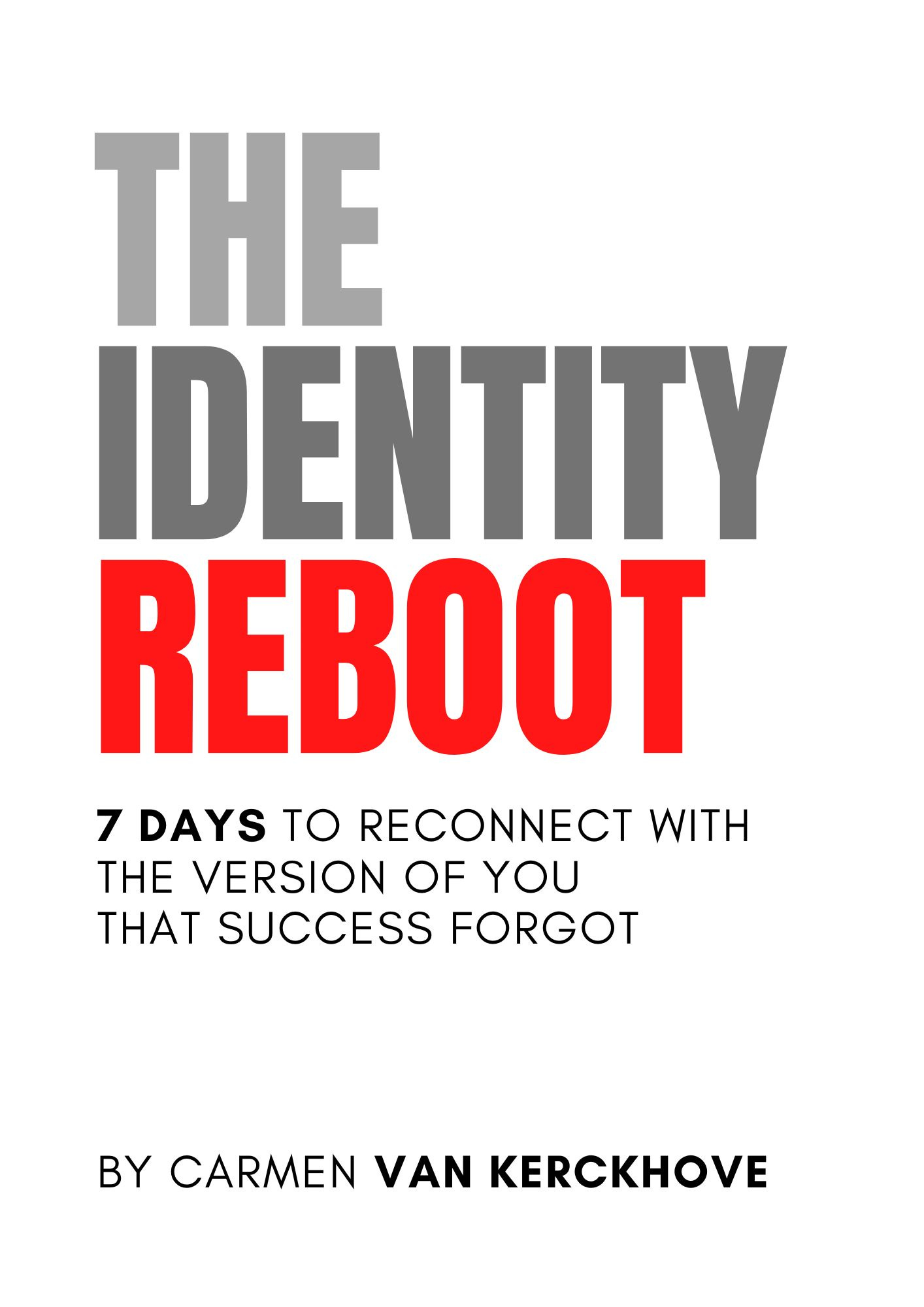This isn’t about AI. It’s about how disposable you’ve always been.
Why companies replace you whether the technology works or not
Last week, I published a piece titled You are not your job. And soon, you won’t have one. The core message was simple, but powerful: our jobs are disappearing faster than we think, and the only real safety lies in knowing who you are beyond your role.
Most people got it. The comments were thoughtful, generous, and deeply engaged.
But a few readers couldn’t resist getting pulled into the same debate we’ve been having for over a year now—whether AI can really replace the kind of work they do.
“LLMs are a lie, they cannot replace anybody in the tech industry and they won't.”
“Isn't current AI totally subsidized by VC money right now?”
To those folks, I want to say: I hear you. And I’m not dismissing your concerns. But you’re arguing the wrong thing.
While you're debating whether AI works, the decisions have already been made
Your employer isn’t waiting for ChatGPT to stop hallucinating before using it to replace coders. They’re not holding off until it stops overusing em dashes before handing it your writing assignments. They’re not pausing until it can retain full context before trusting it with strategic planning decks.
They’re moving forward because it looks innovative. Because it sounds futuristic. Because it pleases investors.
Whether it works well—or at all—is beside the point.
This isn’t about capability. It’s about inevitability.
And we’ve seen this before.
This cycle isn't new. The pattern is older than you think.
Every few decades, a shiny new promise of innovation emerges. Sometimes it works. But often, companies rush in too early, abandon the things that were working, and destroy real value in the process.
Here are just a few examples:
The Railroad Bubble (1870s)
Fueled by government land grants and investor hype, America overbuilt its rail infrastructure before demand or economic sustainability existed. When the bubble burst, dozens of companies went bankrupt. The Panic of 1873 plunged the nation into depression—and rail never fully recovered its dominance.
The Supersonic Misfire (1970s–2000s)
Supersonic jets like the Concorde were supposed to revolutionize air travel. Instead, they became billion-dollar white elephants. Only the ultra-wealthy could afford the sky-high ticket prices, and the economics never worked for the two airlines that operated them. The future of flight arrived too fast, too loud, and far too expensively—and vanished in 2003, a spectacular reminder that tech marvels mean nothing if they can’t sustain a business.
(United is planning to revive supersonic travel by 2029—but whether it ends differently this time is still an open question.)
The Digital Pivot That Gutted Media (2010s)
In the rush to seem “modern,” legacy publishers gutted profitable print operations and threw everything into unproven digital models—especially social video. But digital ad revenue never replaced what print provided. Whole publications folded. The pivot didn’t just fail—it burned down the house.
These weren’t failures of innovation. They were failures of timing—and of pretending the future had already arrived when it hadn’t. And they weren’t just tragic for workers. They were economically devastating for the companies themselves.
In every case, companies abandoned what was profitable to chase what sounded inevitable. And that’s exactly what’s happening now with AI.
I’ve always been the disruptor—and even I see the danger
This isn’t a rant from someone afraid of technology. Quite the opposite.
I’ve almost always been part of the disruption. I was in the first wave of bloggers and podcasters who pressured print media to go digital. I was an early content creator who helped shift ad dollars away from traditional media buys to influencer marketing. I use AI tools every day. Not casually—enthusiastically.
But I’ve also seen what gets sacrificed in the name of progress theater. I’ve seen what happens when we mistake the appearance of innovation for actual evolution.
I’ve seen the same story play out again and again.
And what I want you to understand is this:
These decisions aren't logical. They never were.
We like to think that if we can just prove that AI can’t do our job, we’ll be safe.
But companies don’t make decisions based on nuance or truth. They make decisions based on narrative and optics.
They’re not asking, “Can AI do this job better?”
They’re asking, “Can we say we’ve implemented AI? Will that boost our stock? Will that please investors?”
Look at IBM. A couple years ago, their CEO announced that roughly 30% of back-office roles—like HR and accounting—could be replaced by AI in the next five years. No specifics on how or when. Just the declaration was enough to spike investor interest. That’s not strategy. That’s signaling.
We like to believe we’re in a meritocracy. But we’re living in a hype cycle.
And in that cycle, it doesn’t matter whether your argument is technically correct. Because while you’re busy arguing, your employer is reassigning your responsibilities, rewriting your job description, or phasing your role out entirely.
You can’t logic your way out of this.
The real collapse isn't just economic. It’s existential.
This moment isn’t just about job loss. It’s about identity loss.
What do you do when the scaffolding of who you thought you were starts crumbling?
What happens when your sense of worth was built on being useful, impressive, or indispensable—and suddenly, none of that matters?
I said it in my last post, and I’ll say it again:
The work of figuring out who you are without your job isn’t optional anymore. It’s survival.
This year, the threat is AI. In five years, it’ll be something else we haven’t even imagined yet.
The only constant is this: The cycle is speeding up. What used to take decades now unfolds in months.
If you’re not building an identity that can withstand the next disruption, you will be shattered by it.
This kind of reckoning can feel brutal. But it’s also the beginning of true liberation.
So what now?
If you’ve made it this far, you probably don’t need another upskilling course. You need something deeper.
Stop arguing about whether AI “works.” That conversation is a distraction. Start asking what part of you still stands when your job title disappears.
Build a self that isn’t tethered to what you do, who you report to, or what’s on your resume. Because that’s the only kind of innovation that actually protects you.
Last week, I wrote that the only true safety lies in knowing who you are beyond your job. What I didn’t say—but what became clearer after reading the responses—is this: you’re not just facing a future of disappearing jobs. You’re facing systems that will erase you whether the logic adds up or not.
This isn’t just a reflection. It’s a call.
Don’t wait for your role to vanish to start reclaiming your identity. Do it now—because the only thing more destabilizing than a career collapse is not knowing who you are without it.
Disruption is inevitable. But being unmoored by it is not.
The next collapse is already on its way. Don’t just survive it. Outgrow it.
What’s a time when the world changed around you—your job, your industry, your role—and you had to figure out who you were without it? Was the shift gradual or sudden? What did it teach you about your own value, beyond what you do for work? Share your stories in the comments 👇
A special thank you gift from me to you:
There’s no paywall on any of my writing. Paid subscribers aren’t paying for access—they’re investing in work that resonates.
As a thank-you, you’ll receive a special gift:
The Identity Reboot:
7 Days to Reconnect with the Version of You That Success Forgot
If your sense of self has gotten tangled up in roles, titles, accomplishments—or the pressure to stay impressive—this guide is for you.
This is your reset.
It’s a 7-day PDF experience designed to strip away everything you’ve outgrown, so you can reconnect with what’s real, true, and still yours.
Inside, you’ll:
Uncover who you are beyond the resume, the job title, or the public performance
Identify which parts of your identity feel authentic—and which feel like armor
Rebuild a vision of yourself that isn’t based on productivity, approval, or prestige
This isn’t about starting from scratch. It’s about remembering who you were before the world told you who to be.
If you’ve ever seen yourself in my writing, this is your next step:
And if now’s not the right time?
I’m still glad you’re here.
Bring Carmen to your next event
Carmen Van Kerckhove is an author and keynote speaker whose work explores how technology, social class, and cultural shifts are reshaping work as we know it. Her upcoming book, The Slingshot Effect (Crown Currency), shows why pulling back isn’t a setback—it’s how every breakthrough begins.
Based in New York City, Carmen speaks at keynotes, conferences, leadership summits, and company retreats. Explore her signature talks here.
→ For speaking inquiries, contact info@topflightfamilymedia.com.







I think this identity shift is extremely difficult in a society that ties getting your basic needs met (such as healthcare, food, and shelter) through employers. How can you truly be free with those kind of golden handcuffs impacting your daily life for those ends? The United States operates like one big corporation, not a society of human beings, sadly.
Best training I ever had was a course that trained creatives to make money from their practice, either directly or indirectly. Creatives need to pivot all the time, or have side hussles or second careers and find self worth and existential purpose even if nobody wants to buy their work. On the course we learned how to put together a 'skills resume', introduce ourselves to people in a way that reflected who we really were, to ask other skilled or connected people for advice, and to think creatively about how to apply our skills to meet the needs of the world. Inspiring. Once I saw myself anew I never looked back.